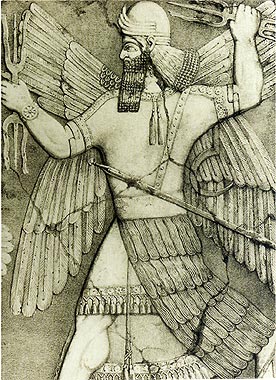Tuesday, March 9, 2010
Ninurta & Kings
The notion of the king as the son of god held true only insofar as it referred to the divine spirit that resided within his human body. In Mesopotamian mythology, this divine spirit takes the form of a celestial savior figure, Ninurta, whose mythological role the Assyrian kings consciously emulated both in ritual and in daily life.
The Ninurta myth is known in numerous versions, but in its essence it is a story of the victory of light over the forces of darkness and death. In all its versions, Ninurta, the son of the divine king, sets out from his celestial home to fight the evil forces that threaten his father's kingdom.
He proceeds against the "mountain" or the "foreign land," meets the enemy, defeats it and then returns in triumph to his celestial home, where he is blessed by his father and mother. Exalted at their side, Ninurta becomes an omnipotent cosmic accountant of men's fates. It is this that the Assyrian kings emulated.
Hero!
*

Hero!
Terror-inspiring Dragon
Of exceptional fearsome-Terror,
Powerful Ninurta!
Rising Hurricane,
Mighty possessor of august strength!
From whose grasp,
No Enemy/Aggressive lands escape!
Fitted for Heroism from the Womb
Unrivaled!
<<< - * - >>>
From Sumer Unto Islam
From El To Al-El.ah (Allah)
Sacred Figure & Paradigm Shifts:
Ninurta / Mardukh (Al-Maarid) / Mikha-El (Michael)
(1)
Ninurta
(Sumerian)
Perceptual Paradigm: Cosmos.
Mode of Communication/Expression: Symbols.
Perceiving Faculty: Soul.
Perceptual Data Processing: Psych(e)ological.
Seat of Polity: Temple.
(2)
Mardukh
(Babylonian / Post-Sumerian 1)
Perceptual Paradigm: Mythos.
Mode of Communication: Poetry.
Perceiving Faculty: Heart.
Perceptual Data Processing: E-motional.
Seat of Polity: Camp.
(3)
Mikha-El / Meekaal
(Abrahamic / Post-Sumerian 2)
Perceptual Paradigm: Logos.
Mode of Communication/Expression: Prose.
Perceiving Faculty: Mind.
Perceptual Data Processing: Mental.
Seat of Polity: Palace.
(4)
” . . . . ”
"Blank / No Name / No Revelation"
( Post-Sumerian 3 )
Perceptual Paradigm: Chaos.
Mode of Communication: Techné.
Perceiving Faculty: Body.
Perceptual Data Processing: Physical.
Seat of Polity: Market.
Paradigm Shifts:
(1)
Cosmos/Age of Gold
(2)
Mythos/Age of Silver
(3)
Logos/Age of Bronze
(4)
Chaos/Age of Iron
* * *

Hero!
Terror-inspiring Dragon
Of exceptional fearsome-Terror,
Powerful Ninurta!
Rising Hurricane,
Mighty possessor of august strength!
From whose grasp,
No Enemy/Aggressive lands escape!
Fitted for Heroism from the Womb
Unrivaled!
<<< - * - >>>
From Sumer Unto Islam
From El To Al-El.ah (Allah)
Sacred Figure & Paradigm Shifts:
Ninurta / Mardukh (Al-Maarid) / Mikha-El (Michael)
(1)
Ninurta
(Sumerian)
Perceptual Paradigm: Cosmos.
Mode of Communication/Expression: Symbols.
Perceiving Faculty: Soul.
Perceptual Data Processing: Psych(e)ological.
Seat of Polity: Temple.
(2)
Mardukh
(Babylonian / Post-Sumerian 1)
Perceptual Paradigm: Mythos.
Mode of Communication: Poetry.
Perceiving Faculty: Heart.
Perceptual Data Processing: E-motional.
Seat of Polity: Camp.
(3)
Mikha-El / Meekaal
(Abrahamic / Post-Sumerian 2)
Perceptual Paradigm: Logos.
Mode of Communication/Expression: Prose.
Perceiving Faculty: Mind.
Perceptual Data Processing: Mental.
Seat of Polity: Palace.
(4)
” . . . . ”
"Blank / No Name / No Revelation"
( Post-Sumerian 3 )
Perceptual Paradigm: Chaos.
Mode of Communication: Techné.
Perceiving Faculty: Body.
Perceptual Data Processing: Physical.
Seat of Polity: Market.
Paradigm Shifts:
(1)
Cosmos/Age of Gold
(2)
Mythos/Age of Silver
(3)
Logos/Age of Bronze
(4)
Chaos/Age of Iron
* * *
Note:
Perception here is Aesthesis in its original Greek sense. English does not do it justice. The same with Psyche, Cosmos et cetera.
Perception here is Aesthesis in its original Greek sense. English does not do it justice. The same with Psyche, Cosmos et cetera.
Subscribe to:
Posts (Atom)


